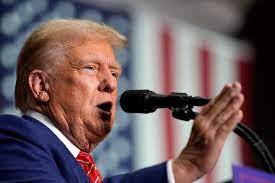
In a strategic move to expand his base and engage with younger voters, former President Donald Trump has turned to conservative male influencers to help spread his message. Recognizing the growing influence of social media personalities among young men, Trump is leveraging these platforms to connect with a demographic that has become increasingly important in the political landscape. This outreach marks a significant shift in campaign strategy, focusing on digital influence and online engagement.
See Here:
The Role of Conservative Influencers
Influencers as Political Catalysts
Conservative male influencers have emerged as key figures in shaping political opinions among young men. These influencers, often active on platforms like YouTube, Instagram, and TikTok, have built large followings by discussing topics ranging from politics to masculinity. By aligning with these voices, Trump hopes to tap into their audiences and gain the support of young male voters who might be disillusioned with traditional media and political messaging.
Key Figures in Trump’s Strategy
Several prominent conservative influencers have been identified as part of Trump’s outreach efforts. These individuals, known for their outspoken views on issues like free speech, gun rights, and economic freedom, resonate with young men who value independence and are skeptical of mainstream narratives. Trump’s team has been working to build relationships with these influencers, offering them exclusive content, interviews, and even personal interactions with the former president.
The Appeal to Younger Men
Understanding the Demographic
Younger men, particularly those in their late teens and twenties, have become a critical demographic for political campaigns. This group is characterized by a strong presence on social media, a preference for alternative media sources, and a growing disconnection from traditional political institutions. Trump’s appeal to this demographic hinges on his ability to present himself as an outsider, someone who challenges the status quo and speaks directly to their concerns.
Issues That Resonate
Trump’s messaging to younger men focuses on issues that resonate deeply with this demographic. Topics like economic opportunity, anti-establishment sentiments, and individual freedoms are central to his outreach. By addressing these concerns and framing them within the context of his political platform, Trump hopes to build a strong connection with young male voters who might otherwise be disengaged from the political process.
The Digital Campaign Strategy
Social Media as a Battlefield
Social media has become a crucial battleground for political campaigns, and Trump’s team is acutely aware of its power. The former president’s outreach to conservative male influencers is part of a broader digital strategy aimed at dominating online discourse. By amplifying his message through these influencers, Trump is able to reach a wider audience and shape the narrative in his favor, often bypassing traditional media outlets.
Content Creation and Engagement
Trump’s strategy involves not just partnering with influencers, but also creating content tailored to the preferences of younger men. This includes videos, memes, and live streams that are designed to be shareable and engaging. The goal is to create viral content that resonates with young men, encouraging them to engage with Trump’s campaign and share his message with their peers.
The Challenges and Criticisms
Potential Backlash
While Trump’s strategy of courting conservative male influencers has the potential to be effective, it is not without risks. Critics argue that aligning with controversial figures could alienate other voter groups and reinforce negative stereotypes. Additionally, there is a concern that focusing too heavily on this demographic might neglect other important segments of the electorate.
Navigating the Controversies
The influencers that Trump is engaging with are often polarizing figures, known for their provocative statements and sometimes controversial opinions. Trump’s campaign must navigate these relationships carefully to avoid backlash that could harm his broader appeal. This balancing act will be critical as Trump seeks to expand his base without alienating moderate and undecided voters.
The Implications for Future Campaigns
Setting a New Precedent
Trump’s outreach to conservative male influencers could set a new precedent for political campaigns. As social media continues to dominate the way people consume information, the role of influencers in shaping political opinions is likely to grow. Future campaigns, regardless of political affiliation, may increasingly rely on these digital voices to reach specific demographics.
The Evolving Role of Influencers
The success or failure of Trump’s strategy could also influence the role that influencers play in future elections. If Trump is able to effectively mobilize young male voters through his partnerships with these figures, it could lead to a broader acceptance of influencers as key players in political campaigns. Conversely, if the strategy backfires, it may prompt campaigns to reconsider how they engage with social media personalities.
Conclusion
Donald Trump’s decision to court conservative male influencers as part of his campaign strategy underscores the growing importance of social media in modern politics. By leveraging the influence of these digital personalities, Trump aims to connect with younger men, a crucial demographic in the upcoming election. As the campaign progresses, it will be interesting to see how this strategy unfolds and what it means for the future of political campaigning in the digital age





